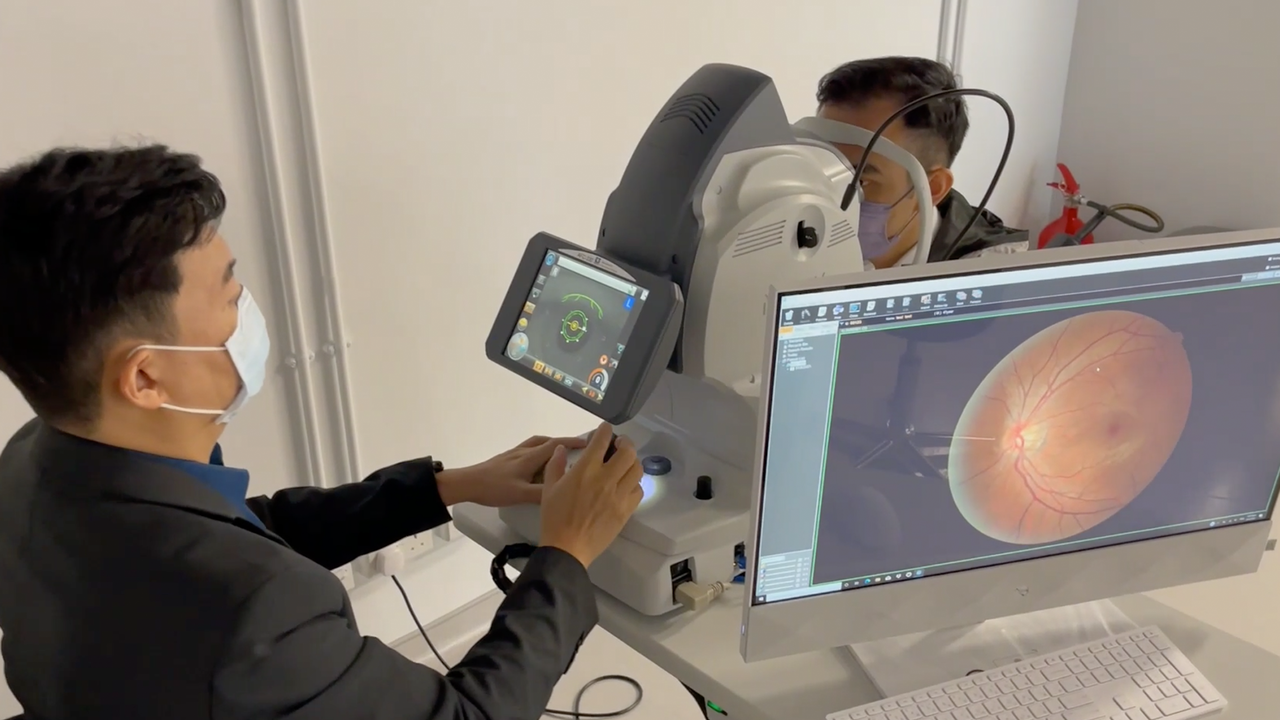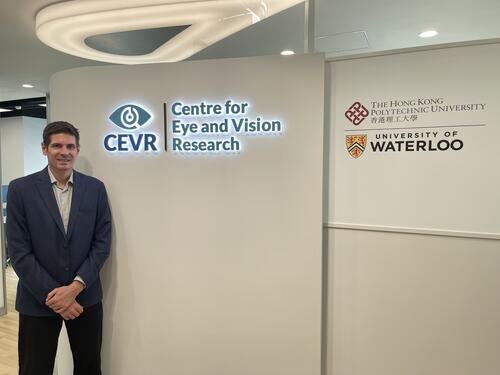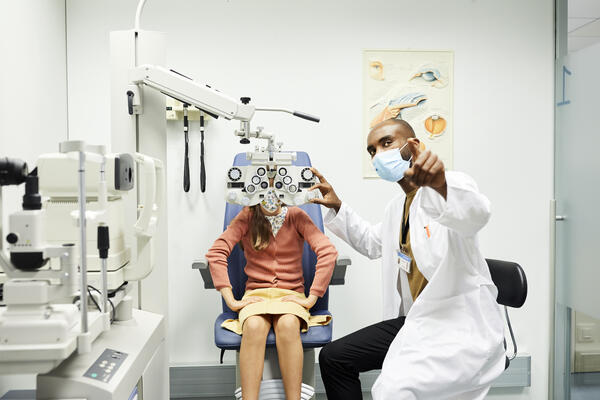
Bringing eye health to the global scale
Waterloo partners with The Hong Kong Polytechnic University to launch first international research hub for eye and vision research

Waterloo partners with The Hong Kong Polytechnic University to launch first international research hub for eye and vision research
By Elizabeth Kleisath Faculty of ScienceVision is one of our most dominant senses, and our world is often built around our ability to see. Despite this, the World Health Organization reports that more than one third of people around the world suffer from some form of vision impairment or blindness. Of these estimated 2.2 billion people, at least one billion of these cases could have been prevented or have not been addressed yet. In these statistics, Asia is disproportionally represented, with the largest portions of the populations not receiving the preventative vision care they need.
With the goal of improving the eye health in the region, the University of Waterloo and The Hong Kong Polytechnic University (PolyU) have been jointly collaborating to launch the world’s first international research hub for vision science, The Centre for Eye and Vision Research (CEVR) in Hong Kong.
 “This groundbreaking partnership showcases the University’s globally recognized excellence in vision health research,” says Charmaine Dean, vice-president, Research and Innovation at the University of Waterloo. “A critical theme especially through the last 18 months of the pandemic is the importance of our global community coming together to drive forward health research. This partnership links tightly to our mission in health and expands our impact beyond our own borders. Fostering international partnerships with accomplished institutions like Hong Kong Polytechnic University accelerates our work in solving complex problems in health care.”
“This groundbreaking partnership showcases the University’s globally recognized excellence in vision health research,” says Charmaine Dean, vice-president, Research and Innovation at the University of Waterloo. “A critical theme especially through the last 18 months of the pandemic is the importance of our global community coming together to drive forward health research. This partnership links tightly to our mission in health and expands our impact beyond our own borders. Fostering international partnerships with accomplished institutions like Hong Kong Polytechnic University accelerates our work in solving complex problems in health care.”
Bob Lemieux, dean of Waterloo’s Faculty of Science, has been closely involved in the development and solidification of this partnership. As a Faculty known to be a global leader in both fundamental and translational research, this partnership will catalyze new discoveries to shape the future of global vision care.
“The launch of CEVR is the result of three years of engagement and development with PolyU and the Hong Kong Special Administrative Region government via the Health@InnoHK program,” says Lemieux. “Both Waterloo and PolyU have strong reputations for innovative research, and I am confident that advances in eye and vision research that will be made through this partnership will be nothing short of extraordinary."
The CEVR research will address five key areas of eye health: myopia and eye growth, ocular drug discovery and delivery, vision enhancement, tear film and ocular surface, and advanced optometric technology.
Myopia (nearsightedness) is increasing in cases and severity worldwide, however researchers still do not understand its cause. Research in this area will focus on finding methods to slow down, prevent or reverse the progression of myopia in patients.
Current medications for eye health are very limited, with eye drops only treating the exterior surface of the eye and limited options for treating the back of an eye, behind the ocular barriers. Research into this field will look for new methods, designs and drugs that are capable of treating these challenging areas of an eye.
Vision enhancement research will focus on developing new technologies for preserving and enhancing the vision of older adults, who are at a higher risk for experiencing deterioration and vision problems.
A study into tear film will be trying to find new biochemical markers that are indicative of dry eye disease, a disease that is one of the most frequent causes of eye care visits and is two to three times higher in Asian patients.
The final area of research aims to develop, validate and commercialize novel techniques and technology for assessing eye and vision health.
Each of these core research programs brings together researchers from Waterloo’s Faculty of Science and PolyU to encourage collaborative, multidisciplinary solutions to the areas and projects being tackled.

Professor Ben Thompson
University of Waterloo
CEVR CEO and Scientific Director
Leading the CEVR are Professor Ben Thompson (Waterloo) as the CEO and Scientific Director, Professor Chi-ho To (PolyU) as the COO and Deputy Scientific Director. Also on the scientific board are Professor Lyndon Jones (Waterloo) and Carly Lam (PolyU). Additional research team members from Waterloo include 17 more faculty members from departments and schools across the Faculty of Science, including Professor Donna Strickland, 2018 Nobel Laureate, who will be leading a project to improve drug delivery to the eye.
“Research conducted within the CEVR has the potential to improve quality of life for millions of people around the world,” says Thompson. “The long-term collaborative relationship between the School of Optometry and Vision Science at Waterloo and the School of Optometry at PolyU forms the core of the centre and our collaborative projects bring together multiple scientific disciplines to tackle the world-wide problem of vision loss.”
CEVR will operate two brand new, state-of-the-art clinical research and bioscience laboratories. The two laboratories support research with patients, drug discovery and biochemistry projects, and provide access to cutting edge clinical and scientific equipment. The Centre for Eye and Vision Research is funded by the Hong Kong Government’s Health@InnoHK initiative.

Read more
World-class eye and vision care on the horizon with the Waterloo Eye Institute

Read more
From disease detection and treatment to visual displays and AR, the future of contact lenses is bright

Read more
Neglecting eye care can seriously put your overall health at risk, especially with work from home orders increasing screen time for most.
The University of Waterloo acknowledges that much of our work takes place on the traditional territory of the Neutral, Anishinaabeg, and Haudenosaunee peoples. Our main campus is situated on the Haldimand Tract, the land granted to the Six Nations that includes six miles on each side of the Grand River. Our active work toward reconciliation takes place across our campuses through research, learning, teaching, and community building, and is co-ordinated within the Office of Indigenous Relations.